1. The Indefinable Essence of Zelda
I would like to start talking about "The Legend of Zelda: Twilight Princess" today. Since many developers are involved with this project, I would like to have as many of them participate in this discussion as possible. First, I will talk with six young staff members who experienced being team leaders for the first time on this project. Just so you know, I am planning to talk with more experienced developers later on, and towards the end I will talk with the director (Eiji) Aonuma-san and (Shigeru) Miyamoto-san. So, let's start by having our young developers introduce themselves.
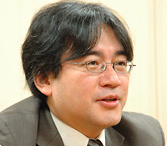
I'm Oyama from Entertainment Analysis and Development (EAD). I was mainly responsible for designing the enemies in Zelda. Before this project, I worked on The Legend of Zelda: Majora's Mask, Pokémon Stadium 2, Luigi's Mansion, The Legend of Zelda: The Wind Waker, Pikmin 2 and The Legend of Zelda: Four Swords Adventures.
My name is Nishimori, and I also work in EAD. I was mainly in charge of designing the player, in other words, Link. Before that, I worked on the animations of the non-player characters (NPCs) in Wind Waker and the characters in Mario Kart: Double Dash!!
I'm Kitagawa from EAD. With this project, I started out as a chief designer for the dungeons, but part way through the project I took over the entire direction of the dungeons, creating the puzzles and other challenges for the player. Before this project, I worked on the terrain in Luigi's Mansion, the dungeons in Wind Waker and after that on the design of the game logo and title screen for Pikmin 2.
My name is Miyagi and I also work in EAD. I was in charge of planning the field design and managing the field design team. The main projects I have worked on before are Super Mario Sunshine and Pikmin 2, but between those two projects I was called in to provide support for some of the terrain graphics in Wind Waker.
I'm Tominaga, also from EAD. Just like Kitagawa-san, I worked on the direction of puzzles and challenges, but I was in charge of designing them for the field portion of the game. As for what I have worked on previously, I was responsible for the positioning of treasure boxes and enemies in Wind Waker. After that I worked on writing the text for Mario Kart: Double Dash!! and then worked on the game localisation for its worldwide release. Most recently, I helped with the debugging of Four Swords Adventures before working on the direction for Super Mario 64 DS.
My name is Kyogoku from EAD. I was in charge of the overall script for this Zelda title as well as planning some of the events that used NPCs. I worked on the script of Four Swords Adventures before joining this team.
I would guess that for all of you here today, this is the first project of this magnitude that you have worked on. The scale of development for a single title doesn't get any bigger than it was for this project. With a project this large, there is always the monumental challenge of including everyone's various ideas in the game while at the same time maintaining its overall integrity. If I were to pinpoint what it is that binds all of these seemingly disparate elements together, I would say that it is each individual's concept of what makes Zelda unique. I would like to ask each of you how you define that for yourself. Let's start with Oyama-san.
Let's see…we are always discussing in the development team what it means for a game to be called a Zelda game, and I really think that there's no clear definition that is shared by everyone. It isn't like there are any rules written down on a piece of paper somewhere. What we do have are the unbroken traditions from the very first "Legend of Zelda" for the Famicom Disk System 1. So we know for instance that Link holds his sword with his left hand... 1 The Legend of Zelda was released for the Famicom Disk System in Japan. Elsewhere in the world, it was released as a cartridge for the NES.
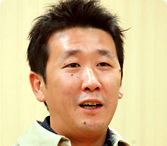
But we suddenly broke with that tradition this time, didn't we! (laughs)
We did! (laughs) Since Link is controlled by the Wii Remote, he swings his sword with his right hand in the Wii version. I think that was the best solution, but even looking at this one point, there were people who said they thought Link should still hold the sword in his left hand. That would always lead to discussions about what the essence of a Zelda game is. We faced this problem when it came to the placement of enemies, the user interface and everything else you could imagine. And we found that we couldn't properly put it into words.
It might not be articulated, but somehow there is a very mysterious shared sense of what this is, isn't there?
There is, and that's why it's so difficult to put it into words.
Moving on, can you give some examples of where in each of your specialised fields you reflected your definition of Zelda in the game? How about you, Kitagawa-san?
Well, I was always thinking about puzzles because I was in charge of the dungeons. I thought the only way to learn what Zelda means was to play the previous Zelda games.
The past games in the Zelda series act as a reference, something like a textbook, don't they?
That's right, because as Oyama-san mentioned, there is nothing like a textbook where these things are written down. So I did my best to find what Zelda meant for myself by playing The Legend of Zelda: Ocarina of Time, Majora's Mask and Wind Waker. What I came away with regarding the puzzles is that each one should build on what the player has already experienced. For example, after the player solves a puzzle by destroying a rock, just when they think that the next puzzle will be the same, you put the rock up somewhere high where it can't be reached. I feel that this gradual stepping up of puzzles is the essence of a Zelda game.
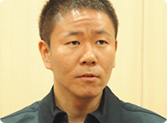
In other words, what the player has just done will be useful to them, but by itself it isn't enough to solve the next puzzle. So you feel that making the player think about that extra step is what makes a Zelda game?
That's right. But it's not enough for it to simply get progressively more difficult. Once the player solves a puzzle, they should be able to move through the game smoothly for a while. In that sense, it's different from the type of games typified by the Mario series that steadily become more difficult.
There is definitely an action-game aspect to Zelda, but it's a little different from the type of game where the player simply learns by repeating the movements over and over again.
I think that's right.
Nishimori-san, you were in charge of designing Link and his movements. What do you think is the essence of a Zelda game?
Up to now I have known Zelda as a player, and what I have always admired about the essence of Zelda games is that when the player wants to see what will happen when they try something, there is always an appropriate response to it in the game. For example, there might be a switch in a dungeon that looks like it should go down if something heavy is placed on it, and the game meets those expectations. Because the game lets the player experiment with so many choices, it doesn't feel like you are being forced to do things. This gives the player the sense that they are making progress in the game by virtue of their own experiences and working things out on their own. For me, the essence of a Zelda game is that feeling the player gets when they are able to solve puzzles in their own way. This is what I kept in mind when I was working on this project.
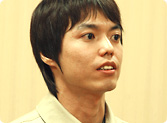
Zelda games do meet the expectations of users in this way, don't they? And that's not only true for puzzle-solving. It also applies to situations in which the player decides to remember the result of taking a particular action because they are sure it will be useful down the road.
That's exactly right.
What you just mentioned is something that we were keenly aware of during development, and it's something we struggled with, too. For example, there might be an enemy that attacks Link by throwing something at him. The easy solution is to use the shield to block it, but we also had to consider what would happen when the player hit it with the sword. These things pile up on top of each other very quickly and it becomes increasingly complicated to create these responses in the game. Taking the same example I just mentioned, if Link is wearing the Iron Boots when he is hit by that attack, should he just take damage or should he also be knocked down? It's never-ending because everything that occurs has an effect on all the subsequent responses. If you're just thinking about this on your own it's overwhelming, but it's undoubtedly an important part of the depth we have come to expect from Zelda games.
I see. Miyagi-san, what do you think is the essence of a Zelda game?
This is a question that I have also struggled with. I even once asked this question to one of the most senior developers in the company who has years of experience with Zelda. You know what I got for an answer? "If the Zelda staff made it, it's Zelda!" (laughs)
It's like a Zen riddle! (laughs)
I remember being very perplexed! (laughs) When I re-played all of the Zelda games starting with the first one, I realised that although what was just mentioned about meeting the expectations of the user is certainly a core part of the Zelda experience, so too is cutting out all of the unnecessary elements. Something that is all too common with games nowadays are movie scenes that the user can't interact with. In Zelda, these are removed to the greatest extent possible in order to allow the player to do what they want. In this respect, Zelda games have a very high level of quality. So when I approached the development of this title, rather than thinking about what Zelda is or means, it was more important for me to preserve the quality of the Zelda series. Rather than thinking about what Zelda is, I thought about where the real quality of Zelda games should lie. For example, the story in Ocarina of Time starts when a small fairy called Navi flies from far away to find Link, an innocent young boy. Then, rather than just watching a movie, the player learns what kind of boy Link is by actually becoming him in the game, and the player is actually introduced to the town when Navi is flying around and bouncing from place to place. These were very effective devices in the introduction to that game.
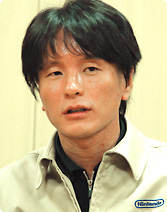
There's nothing unnecessary in there, is there?
Nothing at all. There is no waste in terms of time or data. I learned a lot from that and tried very hard to reach that level of quality during development, but there were a lot of questions for which I wasn't able to find answers. For example, I wasn't able to find satisfactory answers to questions such as whether or not it's still necessary to allow the player to cut the grass in Zelda games.
So, drawing the line between objects the player can interact with and which elicit responses, and those that don't, is very difficult. If you leave too much out the game world won't be realistic enough, but if you try to put too much in it will turn into an endless task.
That's right. I'm ashamed to admit it, but when I wasn't able to find the right balance I had to seek support from Miyamoto-san. This made me realise how little experience I have! (laugh)
I will be sure to ask you about how Miyamoto-san "upended the tea table"2 with his last-minute suggestions later in the interview! (laughs) Tominaga-san, what are your thoughts about what Zelda means? 2 This is a reference to the classic Japanese comic and animated series, Hoshi of the Giants, in which the strict father once upended the tea table when the family was eating their meal there. Shigeru Miyamoto's working style has been compared to this because of his tendency to make last-minute suggestions that leave everyone else scrambling to implement them before the deadline.
Apart from what everyone else has said, I would say that it's the realism of the game world. In other words, whether or not the player will be able to enjoy the story without feeling that it is unnatural. This is something that Miyamoto-san mentions frequently, but I don't mean the kind of realism where each individual strand of hair is accurately depicted, but rather the fact that a shop owner is not likely to give a hearty welcome to a child that comes into their shop in the middle of the night.
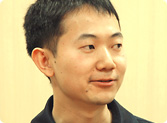
Miyamoto-san is pretty strict about that sort of thing, isn't he?
He is! (laughs)
He once pointed out to me that Link shouldn't be standing upright when there is an enemy standing right next to him. And that was when the player wasn't even controlling Link!
Even though the player's not doing anything, he said "Link would be in a fighting pose if an enemy were standing next to him!" (laughs)
He did! (laughs) But putting in that one little touch has a really big effect on the game.
That kind of attention to detail is what helps establish the realism of the game world.
They might be small details, but by having them pointed out, they set the standard for realism in the game.
That's right. I think that's also an important part of what makes a Zelda game. This is similar to what Kitagawa-san said, but another important factor is how the player feels when they solve a puzzle. The great feeling that comes from hearing the classic Zelda chime is one of the best parts of any Zelda game.
That's true, isn’t it? Whenever I solve a difficult puzzle in Zelda, it always makes me think "I might be pretty smart!" (laughs)
It's absolutely essential. Another thing that's important is having fun getting side-tracked from the main story. You happen to go back somewhere you have already been even though you don't have a particular reason to go there, and you find that you can use one of your new items to get to a new area and find a treasure chest. I think that having a game full of experiences like that might be what makes a Zelda game.
I see. And what about you, Kyogoku-san?
I think you can say the same thing Tominaga-san just said about what the characters in the game say. For example, hearing something unexpected when you talk to a character you haven't talked to in a while, or being surprised when a character gets angry at you for something you casually did. If you overdo it, then it will be a nuisance to players, and there's also no point in putting something in that no one will ever notice. That's why I was always trying to think of subtle things that might or might not be noticed by players. These things are silly in a good way, and I tried to put in as many of them as possible.
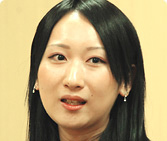
Mention Zelda and people will often say that it's hard-core, a traditional gamer's game, but it's actually completely crammed with these silly things! (laughs)
That's right! (laughs) But things can get out of hand if you overdo it. On the other hand, if we don't put enough of these things in the game, Miyamoto-san will always notice it and send an e-mail saying something like: "I went to all the trouble of trying this in the game and I was sad because I didn't get a new reaction from any of the characters in the game." I called these his "sob story e-mails".
"Sob story e-mails"! (laughs)
These were e-mails where he would describe what he did and what happened in the game, and why that made him sad. In the later stages of development, there was a sob story e-mail every night!
(laughter)
Well, I now understand what Zelda means to each of you. As far as my own opinion is concerned, I have a strong feeling that there are as many definitions of Zelda as there are people. But these definitions are not completely different from each other. Rather they all overlap to some extent with one another. That's why I feel confident that it will come together nicely in the end. Taking it one step further, I think the fact that there isn't a perfect definition that can be expressed in words is the reason that Zelda games offer such a rich and rewarding experience.
